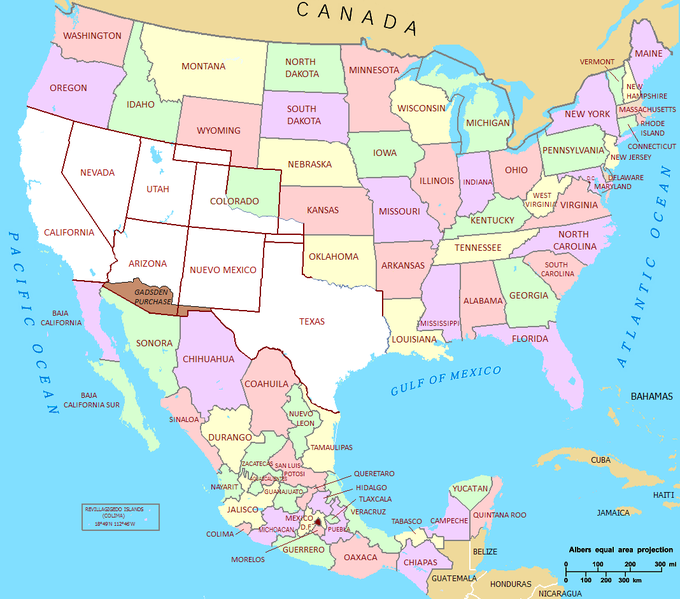Saturday, December 08, 2012
Friday, December 07, 2012
the mysterious noh mask
Methodology/Principal Findings
Conclusions/Significance
By
CNu
at
December 07, 2012
1 comments
![]()
Labels: culture of competence , The Straight and Narrow
Thursday, December 06, 2012
lincoln uncensored...,
By
CNu
at
December 06, 2012
3
comments
![]()
Labels: History's Mysteries , The Hardline
is secession a right?
The right of self-determination … thus means: whenever the inhabitants of a particular territory, whether it be a single village, a whole district, or a series of adjacent districts, make it known, by a freely conducted plebiscite, they no longer wish to remain united to the state to which they belong at the time … their wishes are to be respected and complied with.[5]
extends to the inhabitants of every territory large enough to form an independent administrative unit. If it were in any way possible to grant this right of self-determination to every individual person, it would have to be done.[6]
By
CNu
at
December 06, 2012
1 comments
![]()
Labels: states rights
Wednesday, December 05, 2012
the death of "near death"
Alexander claims there is no scientific explanation for his experiences, but I just gave one. They occurred while his brain function was either on the way down or on the way back up, or both, not while there was little to no brain activity.
The problem, however, is that “CT scans and neurological examinations” can’t determine neuronal inactivity—in the cortex or anywhere else. And Alexander makes no reference to functional data that might have been acquired by fMRI, PET, or EEG—nor does he seem to realize that only this sort of evidence could support his case.
By
CNu
at
December 05, 2012
2
comments
![]()
Labels: magical thinking , What IT DO Shawty...
Tuesday, December 04, 2012
literal holocaust and hell on earth...,
By
CNu
at
December 04, 2012
83
comments
![]()
Labels: The Great Game , unspeakable
gog and magog: top lives off the yield of the bottom
By
CNu
at
December 04, 2012
0
comments
![]()
Labels: as above-so below , banksterism , What Now?
why israel lost the u.n. palestine vote...,
By
CNu
at
December 04, 2012
0
comments
![]()
Labels: The Great Game , The Hardline
Monday, December 03, 2012
former assistant secretary of state for africa got some splainin to do...,
By
CNu
at
December 03, 2012
0
comments
![]()
Labels: FAIL , shameless , The Great Game
Sunday, December 02, 2012
the clinton plan for africa redux
From Reuters (February 28, 2008):
LOS ANGELES, Feb 28 (Reuters) – A safety board has recommended that certain AIDS patients taking part in a study of GlaxoSmithKline Plc’s (GSK.L: Quote, Profile, Research) Epzicom consider switching to Gilead Sciences Inc’s (GILD.O: Quote, Profile, Research) Truvada, sending Gilead’s shares up about 4 percent on Thursday.
The National Institute of Allergy and Infectious Disease’s AIDS Clinical Trials Group, a unit of the National Institutes of Health, is comparing the two drugs in a head-to-head trial involving 1,858 patients.
The unit said on Thursday that an independent Data and Safety Monitoring Board recently found that for patients with high levels of HIV virus, treatment regimens containing Epzicom were less effective at controlling the virus than regimens containing Truvada.
The board also found that patients with high levels of HIV virus treated with Epzicom developed side effects such as body aches and high cholesterol more quickly.
Glaxo said in a statement that the NIH study did not routinely exclude patients at risk for a known reaction with Epzicom, which might have accounted for some adverse events.
The trial recommendation applies to about half the patients being treated with the Glaxo drug and, if translated to real world usage, could mean a 20 percent market share gain for Gilead’s Truvada and Atripla, Morgan Stanley analyst Sapna Srivastava said in a research note on Thursday.
Beijing plans to invest $4 billion in Nigeria’s infrastructure, including a Nigerian state-run oil refinery, a railway line and power plants. Two Chinese telecommunication companies will install rural telephone services financed by $200 million in loans from Beijing.
On the eve of Hu’s visit, the China National Offshore Oil Corporation (CNOOC) paid $2.7 billion for a 45 percent stake in a Nigerian oil field due to start production in 2008. Last year, Nigeria agreed to provide 30,000 barrels of oil per day for five years to China’s largest state-owned oil company, PetroChina, in a deal worth $800 million.
Oil was also top of the agenda in Kenya on April 27-30. In Nairobi, the Chinese president signed an agreement for licenses to allow CNOOC to explore six possible oil blocks off the coast of Kenya. Last year, China provided $36.5 million in aid to Kenya, mainly to upgrade its power stations.
China’s deals with Nigeria and Kenya, as well as other African countries, are direct challenges to the traditional domination of the continent’s oil by American and European companies. (See Western concern at China’s growing involvement in Africa)
China’s energy diplomacy was spelled out by Yang Peidong, a foreign ministry consultant, in a recent edition of China Economic Weekly. Beijing is now focusing on “the extension of trade and the promotion of energy, resources and technology cooperation” as the heart of China’s foreign policy, he wrote.
China’s strategy is to offer infrastructure projects to the resource-rich countries in Middle East, Africa and Latin America to facilitate, and in exchange for, the export of minerals to China. China is now the world’s sixth largest engineering contractor, with its new contracts up 24 percent to $39 billion last year. In some cases, China has also financed and even armed regimes, such as in Sudan and Zimbabwe, in order to protect its resource interests.
In comments to Reuters during Hu’s visit, former Nigerian foreign minister Bolaji Akinyemi attempted to play down possible tensions with Washington. “In the Middle East, the US regards China’s incursion with alarm, but Nigeria is more virgin territory for suitors and Washington should not be too worried,” he said.
The Bush administration, however, regards China’s moves in Africa as far from benign. Its recently published National Security Strategy openly states US concerns over China as “expanding trade, but acting as if they can somehow ‘lock up’ energy supplies around the world or seek to direct markets rather than opening them up—as if they can follow a mercantilism borrowed from a discredited era; and … supporting resource-rich countries without regard to their misrule at home or misbehaviour abroad of those regimes.”
By
CNu
at
December 02, 2012
8
comments
![]()
Labels: cognitive infiltration , Deep State , Living Memory
why did israel lose europe's support in the U.N.?
By
CNu
at
December 02, 2012
1 comments
![]()
Labels: you used to be the man
Saturday, December 01, 2012
greeks on the road to haitian hell...,
By
CNu
at
December 01, 2012
47
comments
![]()
Labels: Collapse Casualties
greeks quick to throw fists when pissed...,
It was a brutal sign of the fury many Greeks feel at the way the country's debt crisis has dashed hopes of a comfortable old age. Greece's pension funds - patchily run in the first place, say unionists and some politicians - have been savaged by austerity and the terms of the international bailout keeping the country afloat.
Workers and pensioners suffered losses of about 10 billion euros ($13 billion) just in the debt restructuring of March 2012, when the value of some Greek bonds was cut in half. That sum is equal to 4.6 percent of the country's GDP in 2011.
Many savers blame the debacle on the Bank of Greece, the country's central bank, which administers three-quarters of pension funds' surplus cash. Pensioners and politicians accuse it of failing to foresee trouble looming, or even of investing pension fund money in government bonds that it knew to be at high risk of a 'haircut' - having their value reduced.
A Reuters examination of previously unpublished data from the Bank of Greece reveals the bank invested pension fund money in 1.18 billion euros of Greek bonds after the economic crisis began.
Prokopis Pavlopoulos, a lawmaker in the ruling coalition's conservative New Democracy party and former interior minister, said: "From July 2010 it was obvious that a debt restructuring would be inevitable. While foreign banks were unloading their Greek government bonds, no one moved to tell Greek pension funds to do something, that a haircut was coming."
Spanopoulou, while deploring the violence she suffered, said: "The Bank of Greece knew about the haircut on bonds well in advance and should have informed (our) fund."
By
CNu
at
December 01, 2012
5
comments
![]()
Labels: Collapse Casualties
california marijuana decriminalization drops youth crime rate to record low
By
CNu
at
December 01, 2012
2
comments
![]()
Labels: common sense , narcoterror
Friday, November 30, 2012
irredentism - the long-term wages of piracy...,
It’s common enough for Americans, if they think of irredentism at all, to think of it as somebody else’s problem. Airily superior articles in the New York Times and the like talk about Argentina’s claim to the Falklands or Bolivia’s demand for its long-lost corridor to the sea, for example, as though nothing of the sort could possibly spill out of other countries to touch the lives of Americans. I can’t think of a better example of this country’s selective blindness to its own history, because the great-grandmother of irredentist crises is taking shape right here in North America, and there’s every reason to think it will blow sky-high in the not too distant future.
That’s the third and last of the hot button topics I want to discuss as we close in on the end of the current sequence of posts on the end of American empire, and yes, I’m talking about the southern border of the United States.
Many Americans barely remember that the southwestern quarter of the United States used to be the northern half of Mexico. Most of them never learned that the Mexican War, the conflict that made that happen, was a straightforward act of piracy. (As far as I know, nobody pretended otherwise at the time—the United States in those days had not yet fallen into the habit of dressing up its acts of realpolitik in moralizing cant.) North of the Rio Grande, if the Mexican War comes to mind at all, it’s usually brushed aside with bland insouciance: we won, you lost, get over it. South of the Rio Grande? Every man, woman and child knows all the details of that war, and they have not gotten over it. Fist tap Dale.
By
CNu
at
November 30, 2012
2
comments
![]()
Labels: Collapse Casualties , you used to be the man
arab spring chickens steady coming home to roost...,
By
CNu
at
November 30, 2012
6
comments
![]()
Labels: American Original , Ass Clownery , you used to be the man
can israel survive?
By
CNu
at
November 30, 2012
0
comments
![]()
Labels: American Original , you used to be the man
Chipocalypse Now - I Love The Smell Of Deportations In The Morning
sky | Donald Trump has signalled his intention to send troops to Chicago to ramp up the deportation of illegal immigrants - by posting a...

-
theatlantic | The Ku Klux Klan, Ronald Reagan, and, for most of its history, the NRA all worked to control guns. The Founding Fathers...
-
NYTimes | The United States attorney in Manhattan is merging the two units in his office that prosecute terrorism and international narcot...
-
Wired Magazine sez - Biologists on the Verge of Creating New Form of Life ; What most researchers agree on is that the very first functionin...








